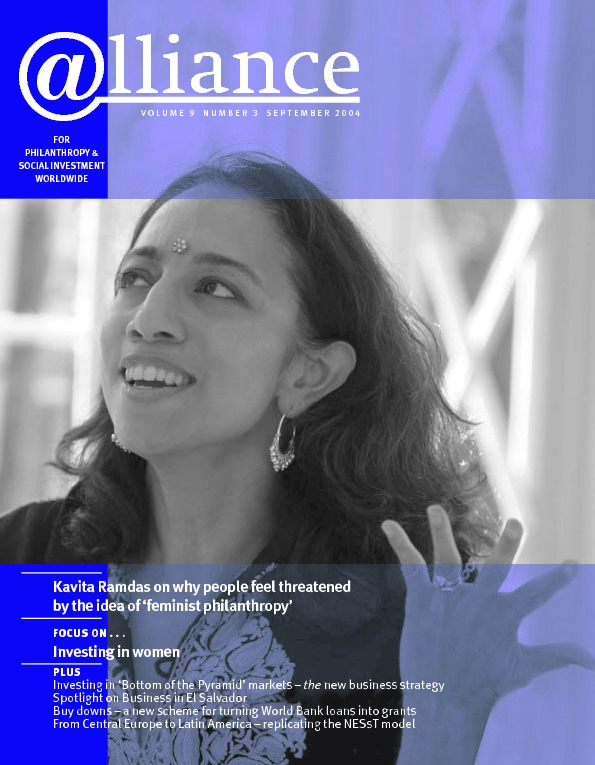Rated by Business Week as one of the world’s top ten business thinkers, Professor C K Pralahad has spent over 20 years studying multinational corporations and defining the ‘next practices’ of the Western business world. But for the last five or six years he has become ‘obsessed’, to use his own words, with the idea of business investing in ‘Bottom of the Pyramid’ or BOP markets – what he describes as ‘the new private sector strategy around poverty and development’. What is it all about?
The ‘problem to be addressed’, says Pralahad, is the 4 billion people in the world who live on less than US$1,500 per annum. For 50 years we have tried to address this but the problem persists. Creative experimentation is taking place among local NGOs, but are 50 NGOs in 50 places all learning the same thing? What if someone could come along and bring all this effort together? ‘What if you combined the local knowledge and operational capacity and commitment to equity and fairness of NGOs with the scale and scope of MNCs?’ This was just a ‘thought experiment’, an open question.
Once he started to look, he found a few organizations experimenting and doing ‘extraordinary things’. Some of these are presented as case studies in his new book, The Fortune at the Bottom of the Pyramid. Eradicating poverty through profits,[1] published in July. One of the most impressive innovations is the Jaipur Foot. This predominantly handmade artificial foot, made and fitted by Indian NGO Bhagwan Mahaveer Viklang Sahayata Samiti, costs about $30 (as opposed to the average $8,000 it costs in the US) and is designed to meet the needs of a developing country lifestyle – squatting, walking (barefoot), sitting (cross-legged).[2] The real question is: can such experiments be expanded?
As Pralahad sees it, the biggest problem for poor people is lack of dignity and choice. Consumers are always respected, and by definition must have choice. Can we think of the poorest people as consumers, as a market, rather than a problem? To reach 4 billion people, we will need innovative hybrid solutions – combining high technology and scale combined with an understanding of local cultural and market conditions. ‘We will need to get the price right so poor people can afford to buy world-class products.’ One successful response has been to offer single-wash sachets of shampoo so poor people can buy good-quality shampoo for a special occasion or when they have the money. He talks of companies and NGOs working together to create an ecosystem for wealth creation that can change our world.
At a meeting in London on 23 June, jointly hosted by Globalegacy and IIED,[3] C K Pralahad met with a group of academics and NGOs to hear their reactions to his idea. Not surprisingly, questions centred round issues like: what are the key aspects of an enabling environment that would allow such a model to work? How do you enforce contracts between parties whose power is very unequal? What are the key bottlenecks that might prevent things working? How do you create the competition that will keep prices down? Pralahad had some answers for these questions: the enabling environment is very contextual; it will be different for different products and different societies. Yes, a basic legal structure will be needed.
Perhaps harder to answer were questions relating to the behaviour of companies. The business case for investing in BOP markets seems an obvious one: it’s a huge market waiting to be tapped. You can’t ignore 80 per cent of the world. Pharmaceutical companies are beginning to site laboratories in developing countries even though the products developed will not be high-margin and highly profitable. If companies need to work with NGOs in order to reach these poor markets, then they will. Whether the model will work for sustainable development is less clear. Going back to the single-use sachets of shampoo, the plastic packaging used represents a potential environmental disaster – how do you get companies to invest in biodegradable packaging?
Pralahad falls back on a measure of optimism: yes, the BOP model is bound to be misused, but that doesn’t mean we shouldn’t try to solve our problems? Checks and balances will be needed, and external governance may be needed to introduce them. But there is also peer pressure: if ten large companies try to do this right, can’t we develop new standards and pressure others to adopt them? NGOs can play a part in making sure companies do it right.
And there may even be a genuine wish to do the right thing. Many people of 40-45 who head MNCs are looking for meaning in their lives, says Pralahad. They want to make their businesses work but they also want to do it right. Ironically, companies may be better at getting the social and environmental aspects right than the economic aspects. Issues like retaining wealth in communities are a complete unknown for most companies.
1 C K Prahalad (July 2004) The Fortune at the Bottom of the Pyramid: Eradicating Poverty Through Profits Wharton School Publishing. See http://www.whartonsp.com
2 Developed in 1968, these are primarily made and fitted by Indian NGO Bhagwan Mahaveer Viklang Sahayata Samiti. The average cost in the US is $8,000.
3 International Institute for Environment and Development.
C K Prahalad is Harvey Fruehauf Professor of Business Administration, University of Michigan Business School, Ann Arbor. He can be contacted at ckp@umich.edu





Comments (0)